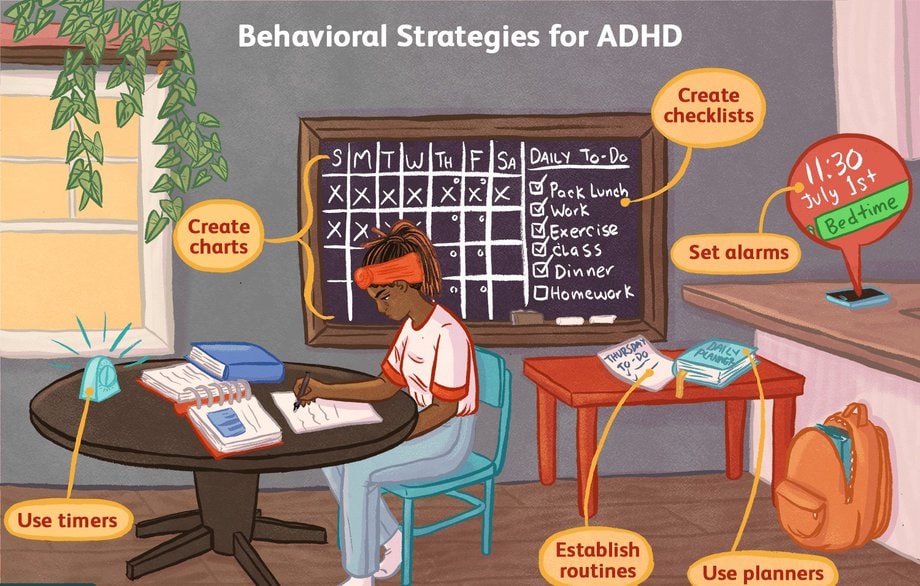What Are Stimulant Medications And Their Role In Adhd Treatment?

Attention-deficit/hyperactivity disorder (ADHD) is a neurodevelopmental disorder that affects both children and adults. It is characterized by symptoms of inattention, hyperactivity, and impulsivity, which can significantly impair daily functioning and quality of life.
Stimulant medications are commonly prescribed as a first-line treatment for ADHD due to their ability to effectively manage these symptoms. This article aims to provide an overview of stimulant medications and their role in the treatment of ADHD. It will discuss the different types of stimulant medications used, their mechanisms of action, and their effectiveness in managing ADHD symptoms.
Additionally, potential side effects and risks associated with stimulant medication use will be explored, along with considerations and guidelines for initiating treatment. It is important to understand the role of stimulant medications within a comprehensive treatment plan for ADHD management, as they can significantly improve symptoms and enhance overall functioning.
Key Takeaways
- Stimulant medications, such as methylphenidate and amphetamines, are commonly prescribed as the first-line treatment for ADHD.
- These medications work by enhancing dopamine and norepinephrine neurotransmission, which helps improve focus, attention, and reduce hyperactivity and impulsivity.
- Stimulant medications are generally safe and effective for long-term use, with well-established benefits in reducing ADHD symptoms.
- However, individual response to medication may vary, and dosage adjustment is critical for optimal effectiveness while minimizing side effects.
Understanding ADHD and the Need for Treatment
ADHD is a neurodevelopmental disorder characterized by persistent patterns of inattention, hyperactivity, and impulsivity, necessitating the need for effective treatment options.
The prevalence of ADHD is estimated to be around 5-10% in children and 2-5% in adults.
The symptoms of ADHD can significantly impact various aspects of daily life, including academic performance, social relationships, and occupational functioning.
Individuals with ADHD often experience difficulties in maintaining attention, organizing tasks, and controlling impulsive behavior. These challenges can lead to significant impairments in educational achievement, job performance, and interpersonal relationships.
Therefore, it is crucial to identify appropriate treatment strategies to mitigate the negative consequences associated with ADHD.
Stimulant medications have been widely recognized as the first-line treatment for ADHD due to their effectiveness in reducing symptoms and improving functional outcomes. They work by enhancing dopamine and norepinephrine neurotransmission, leading to improved attention, self-control, and impulse regulation.
Types of Stimulant Medications Used in ADHD Treatment
One category of drugs commonly prescribed for the management of attention deficit hyperactivity disorder consists of different types of stimulant medications.
Stimulant medications, such as methylphenidate and amphetamines, are considered the first-line treatment for ADHD due to their effectiveness in reducing symptoms of inattention, hyperactivity, and impulsivity. These medications work by increasing the levels of certain neurotransmitters in the brain, leading to improved focus and attention.
When it comes to dosage recommendations, healthcare professionals typically start with a low dose and gradually increase it based on the individual’s response and tolerability. It is important to find the optimal dose that provides the desired therapeutic effects while minimizing side effects.
In terms of long-term effects, stimulant medications have been extensively studied and have shown to be safe and effective for long-term use in managing ADHD symptoms. However, regular monitoring is necessary to evaluate the ongoing benefits and potential side effects.
Mechanisms of Action of Stimulant Medications
Stimulant medications exert their therapeutic effects by increasing the levels of specific neurotransmitters in the brain, enhancing focus and attention in individuals with attention deficit hyperactivity disorder (ADHD).
These medications primarily target the dopamine pathways in the brain, which are involved in regulating attention, motivation, and reward. By increasing dopamine levels, stimulant medications improve the functioning of these pathways, leading to improved attention and reduced impulsivity and hyperactivity.
The main mechanism of action of stimulant medications involves blocking the reuptake of dopamine and norepinephrine, two neurotransmitters involved in regulating attention and impulse control. This results in increased levels of these neurotransmitters in the brain and prolonged stimulation of their receptors.
By enhancing the availability of these neurotransmitters, stimulant medications promote the transmission of signals in the brain, thereby improving focus and attention in individuals with ADHD.
Overall, the therapeutic effects of stimulant medications in ADHD are primarily mediated through their ability to increase dopamine and norepinephrine levels in the brain, ultimately leading to improved attention and reduced symptoms of impulsivity and hyperactivity.
Effectiveness of Stimulant Medications in Managing ADHD Symptoms
The efficacy of stimulant medications in managing symptoms of attention deficit hyperactivity disorder (ADHD) has been extensively studied and confirmed through various clinical trials and research studies. These medications, including methylphenidate and amphetamine-based drugs, are the first-line treatment for ADHD due to their effectiveness in reducing hyperactivity, impulsivity, and improving attention span and cognitive function.
Stimulant medications work by increasing the levels of neurotransmitters such as dopamine and norepinephrine in the brain, which play a key role in regulating attention and behavior. Studies have consistently shown that stimulant medications significantly reduce ADHD symptoms in both children and adults.
However, it is important to note that individual response to medication may vary, and the effectiveness of stimulant medications should be regularly monitored and adjusted based on the individual’s needs and tolerability.
Overall, stimulant medications have proven to be highly effective in managing the symptoms of ADHD.
Potential Side Effects and Risks of Stimulant Medications
Potential side effects and risks associated with these medications should be carefully considered and monitored. While stimulant medications have been proven effective in managing ADHD symptoms, it is crucial to acknowledge their potential risks and common side effects.
- Common side effects:
Stimulant medications may cause appetite suppression, difficulty sleeping, and increased heart rate. These side effects usually diminish over time or can be managed with dosage adjustments or other interventions. - Potential risks:
There is a small risk of developing cardiovascular problems, such as high blood pressure or heart disease, particularly in individuals with pre-existing heart conditions. Additionally, stimulant medications can lead to psychological effects like irritability, anxiety, or mood swings. However, these risks are relatively rare and can be mitigated with proper monitoring and dose adjustments. - Long-term effects:
The long-term effects of stimulant medication use in children with ADHD are still being studied. While some studies suggest potential growth delay or transient changes in heart rate or blood pressure, the overall benefits of medication use often outweigh these risks. Close monitoring and regular check-ups are essential to ensure the well-being of individuals taking stimulant medications for ADHD.
Considerations and Guidelines for Starting Stimulant Medication Treatment
Considerations and guidelines for initiating pharmacological intervention in the management of attention deficit hyperactivity disorder (ADHD) should be carefully evaluated and followed. When considering the use of stimulant medications, the starting age is an important factor to consider. Generally, stimulant medications are approved for use in children aged six years and older. However, individual circumstances may warrant starting medication at a younger age.
It is crucial to assess the child’s developmental stage, severity of symptoms, and potential benefits and risks of medication. Additionally, dosage adjustment is a critical aspect of starting stimulant medication treatment. The initial dosage should be carefully determined based on the child’s weight, age, and symptom severity. Frequent monitoring and dose adjustments may be necessary to ensure optimal effectiveness and minimize side effects.
Close collaboration between healthcare providers, parents, and educators is essential in successfully initiating and managing stimulant medication treatment for ADHD.
Importance of a Comprehensive Treatment Plan for ADHD Management
Comprehensive treatment plans play a vital role in effectively managing and addressing the symptoms associated with attention deficit hyperactivity disorder (ADHD). ADHD is a complex neurodevelopmental disorder characterized by symptoms of inattention, hyperactivity, and impulsivity.
While stimulant medications are commonly prescribed for ADHD treatment, they are just one component of a comprehensive treatment plan. A comprehensive treatment plan for ADHD management should include a combination of medication, behavioral therapy, psychoeducation, and support from healthcare professionals, parents, and teachers. This approach takes into account the unique needs and challenges of each individual with ADHD, and aims to improve their overall functioning and quality of life.
By incorporating multiple strategies, a comprehensive treatment plan helps to address the core symptoms of ADHD, as well as any associated difficulties in academic performance, social interactions, and emotional well-being.
Overall, a comprehensive treatment plan is essential for optimizing ADHD management and promoting positive outcomes for individuals with this disorder.
Frequently Asked Questions
What are some alternative treatments for ADHD besides stimulant medications?
Non-medication interventions and natural remedies can be used as alternative treatments for ADHD. These include behavior therapy and cognitive therapy, which aim to address the behavioral and cognitive symptoms associated with ADHD without the use of stimulant medications.
Can stimulant medications be used in combination with other medications for treating ADHD?
Combination therapy, involving the use of stimulant medications along with non-stimulant medications, is a viable approach for treating ADHD. Research suggests that combining these medications can enhance the effectiveness of treatment and may be beneficial for certain individuals.
How long does it typically take for stimulant medications to start working?
The average response time for stimulant medications to start working varies, but it is typically within 30 to 60 minutes after ingestion. Dosage adjustments may be necessary to achieve optimal results in ADHD treatment.
Are there any long-term effects of using stimulant medications for ADHD treatment?
Long-term use of stimulant medications for ADHD treatment may have potential risks, including but not limited to, side effects such as decreased appetite, sleep disturbances, and potential cardiovascular effects. Further research is needed to fully understand the long-term effects.
Are there any specific considerations for adults with ADHD when starting stimulant medication treatment?
Specific considerations for adults with ADHD when starting stimulant medication treatment include potential side effects such as increased heart rate and blood pressure, insomnia, and loss of appetite. Close monitoring by a healthcare provider is necessary to ensure safety and effectiveness of the medication.








